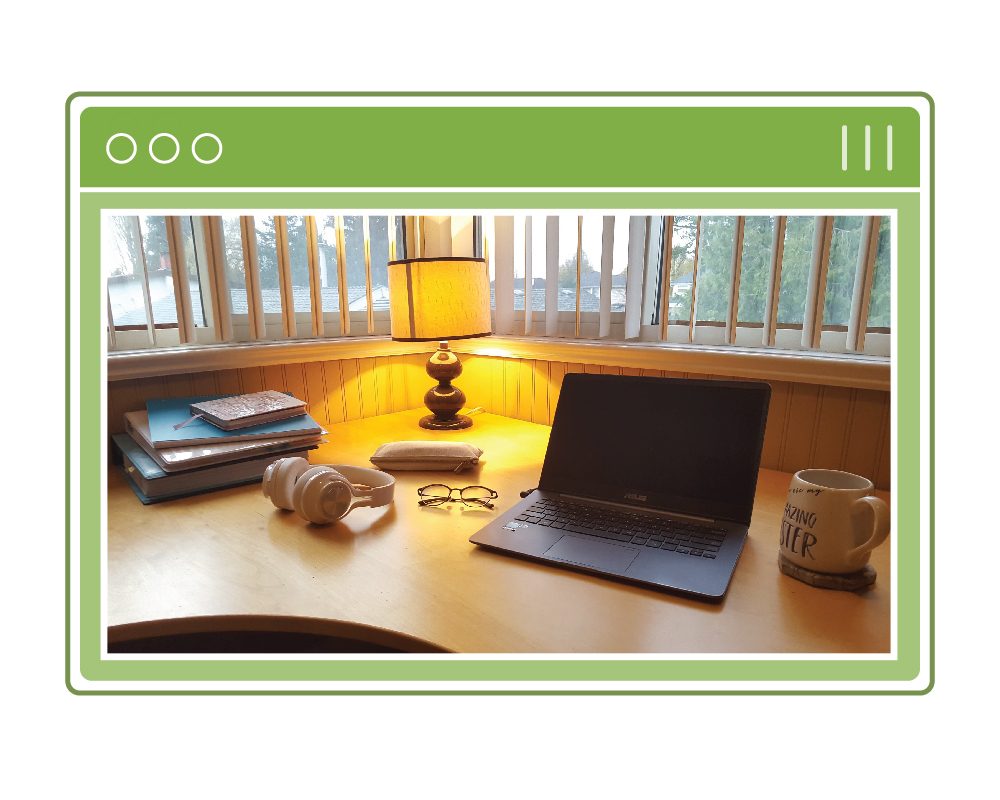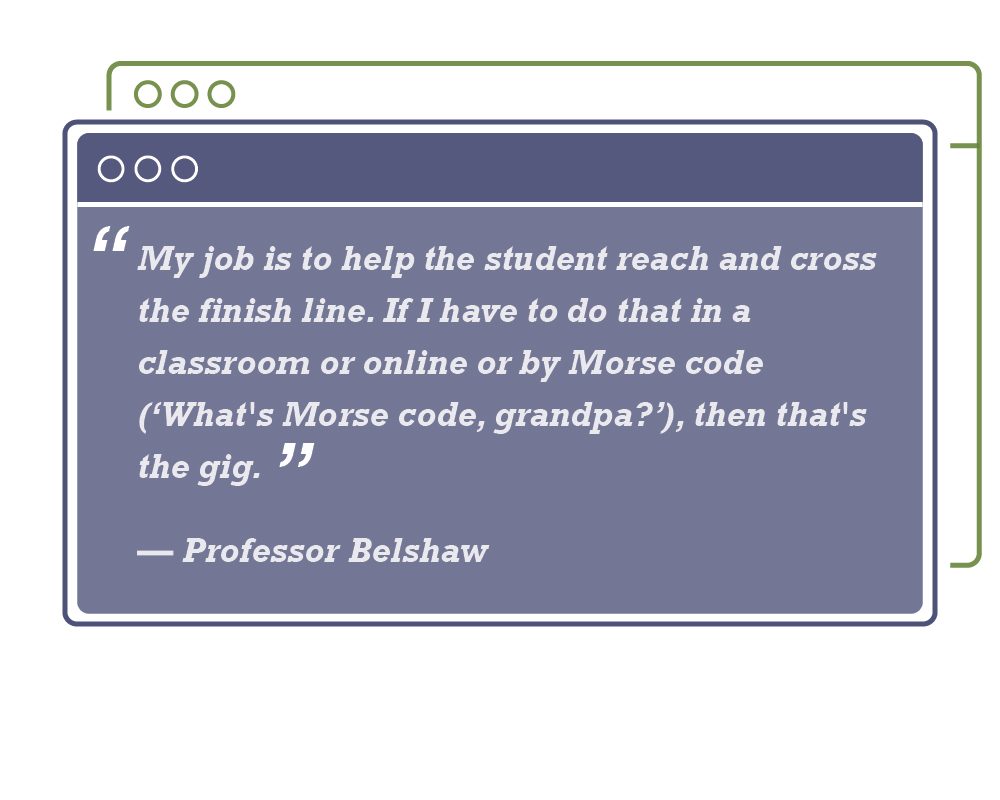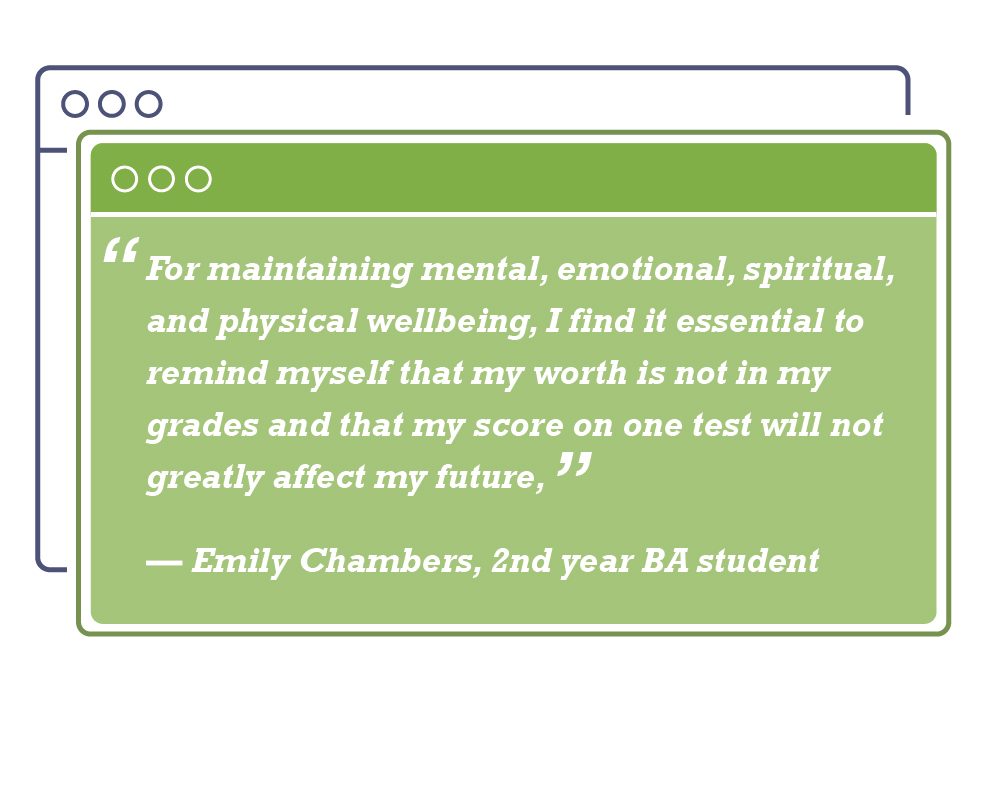What are students and professors saying about online education?
Stressful. Unmanageable. Flexible. Lacks connection. These are just some of the words students are using to describe online education, as UFV’s first fully online fall semester begins to wind down. As the university prepares for another online semester for Winter 2021, it is important to reflect on the challenges and strategies of online education. Are UFV students and professors enjoying the flexibility and independence of online classes, or is it overwhelming? Is UFV providing the best education possible during this time? The Cascade reached out via email to several students and staff to hear what they had to say about online courses.
Students and online courses
Tim Algera, a third-year student majoring in physics and geography, has found the online semester difficult, and notes that the course load feels heavier than in past semesters. “At first I was excited to be studying from home, since I thought it would save me time,” Algera said. “Since I would no longer be commuting, I thought I would have more free time in the semester. Far from it. Somehow, studying at home takes more time, is more emotionally draining, and is less productive.” However, he does not believe his education is suffering — only that it takes more mental energy to learn the material and achieve similar grades.
Other students are finding the semester challenging but manageable. Emily Chambers, a second-year Bachelor of Arts student, is mostly taking synchronous classes this semester. Compared to asynchronous classes, in which students complete the course work without regular meeting times, synchronous classes have consistent meeting times each week to maintain a regular schedule. The structured routine has allowed her to interact with her professors and classmates “in a meaningful way.” This is a striking contrast to her asynchronous classes during the online summer semester. In the summer, the structure-less approach and the inconsistent organization of her professors made it more difficult to keep up with the course material.
Professors and online courses
Students are not the only ones in transition, of course. Professors are finding new ways to engage with students and provide substantial education in their classes.
Anna Griffith is teaching classes in theatre and interdisciplinary studies this semester. She has not taught online before. “I am expanding into new ways of approaching material, thinking differently about engagement and activities, and experimenting with our learning management system much more than I have in the past,” Griffith said. “As much as I miss the embodied aspects of teaching and learning, this experience has pushed me to explore different aspects of the classes I teach, like highlighting on-camera acting and voice work.”
There is not only the challenge of teaching online, but recognizing the challenges students are facing outside of their classwork. Rachel Toews is a mathematics and statistics professor at UFV, teaching MATH 125 and MATH 111 this semester. She has been impressed with student engagement: “I have students who have been sick with COVID-19, are grieving a family member, are writing tests in the middle of the night from different time zones, have parents out of work, have jobs in which they have COVID-19 exposure, [or] are isolated from their usual support systems. 2020 has been extra stressful in so many ways. I see students showing up and doing their best despite these challenges, and I admire that.”

The challenges of an online semester
Many students are finding it challenging to stay engaged in their classes. Danielle West, a student receiving an integrated studies degree, is enrolled in one class, with work and a newborn occupying the rest of her time. However, she recognizes that other students have a more difficult time staying connected. “It has definitely been a bit more of a challenge to connect with the teacher and fellow students without the benefit of a physical classroom,” said West. “Even though I (unlike many others) have been able to reach out to my classmates via email, there’s a sense that most students are too swamped to even respond to any non-mandatory communications.”
Toews, who has not taught online before, has found the transition to online education challenging. “In the classroom, I could see comprehension or confusion on faces,” Toews said. “I could see who was trying the examples we were working on, and who was not. When I saw a confused student in the classroom, I could help that student. My strengths as a teacher are that I love mathematics and I care very much about my students. I don’t think either of these things transfer very easily to the online environment.” Between videos the students watch before class and a live class on Blackboard Collaborate, Toews has found that attendance and participation is fairly good. However, she worries for the students who are struggling and not speaking up in class.
There is also the struggle of working from home. Algera, who studies at his desk in his bedroom, admits that this isn’t an ideal setup. “There are always distractions that I can find to justify procrastinating,” he said. “When school and home are no longer separated, their responsibilities are no longer separated — and both suffer as a result.”

What are the benefits to online education?
Despite the challenges, however, students’ experiences have not been entirely negative. Chambers outlined some of the benefits to online classes. “I enjoy being able to type my questions or comments freely in the chat feature on my Zoom and Blackboard classes,” she said. “This feature allows me to get my ideas out when I need without interrupting the professor.” She is also saving time because she no longer commutes to school, and her schedule is more flexible in an online format.
An online semester in the midst of a pandemic
John Belshaw is a history professor teaching pre- and post-Confederation Canadian history courses this semester. He is also developing a new HIST 399 course called “Populations and Pandemics” for the winter semester. He believes that the COVID-19 pandemic — and social reactions — are on par with the 1918 influenza pandemic. “In March and April, it was a bit like, ‘Oh, what a lovely war!’ Something new and a bit exciting and what’s going to happen next, and people are buying Dr. Henry t-shirts and so on,” Belshaw said. “Now, we’re heading into the dark months and fatigue is evident.”
Belshaw went on to explain that the pandemic is changing how university students experience their education — even after the pandemic.
“The ‘experience’ of university was long touted as involving on-campus life (i.e. sports, dorms, bad food, the odd band, maybe a frat/sorority house … ew),” he stated over email. “But much of that model was designed in the 1920s for a different socio-economic class. If university education is more about accessibility to the greatest number, then we may be rounding a corner right now.”
Since UFV’s student body is commuter-based, campus life has never been its strongest feature. UFV students may find it easier to transition to online classes than students at older schools like UBC or McGill, because they may already be focused on courses and credits instead of the university environment. But what will this mean for UFV students after the pandemic?
“When I worked at North Island College, we tracked where our distance [education] students lived and discovered that they were never spatially distant; they were temporally distant,” Belshaw continued. “They lived within a two-km radius of the campus but just couldn’t attend the scheduled classes. That’s what this ‘pivot’ to remote will reveal: I’m guessing that upwards of half the students and half the faculty will remain at a distance through the 2020s, regardless of COVID-19. There, I’ve said it. You heard it here first.”

Strategies for online learning
So, how can students stay focused and organized while learning online? Solutions may come from noticing what doesn’t work and seeking to change that. West has found it difficult to focus while listening to pre-recorded lectures. “The best solution I have found for this is to occupy my hands with a non-language-based activity such as a colouring book or a colour-matching game on my phone,” she said.
Chambers suggests meeting with a classmate or friend to study together (virtually, at the moment). She prioritizes sleep in order to have enough energy to complete her studies and maintain a healthy mental state. She also suggests a planner to keep track of dates and deadlines. Most important, however, is not getting overwhelmed over classes. A healthy mindset is key.
“For maintaining mental, emotional, spiritual, and physical well-being, I find it essential to remind myself that my worth is not in my grades and that my score on one test will not greatly affect my future,” Chambers said. “It is all too easy to get consumed with schoolwork, but it is helpful to take time to step back and realize that life is bigger than success or failure, and realize that although we value our education and should do our best, we don’t need to stress so much.”
Other students are aware of the need to take breaks and get out of the house for physical activity, but simply haven’t found the time. “Between university and my work, I always seem to be busy with something,” Algera said. “Honestly, the only thing getting me through this semester is telling myself that it will end. But when? Who knows?” The uncertainty about how many semesters online school will last makes it difficult to stay motivated and hopeful.
Thoughts for the upcoming online semester
UFV announced that it will continue to deliver courses online through the Winter 2021 semester. Does that mean struggling students and professors should despair? Not exactly. They have strategies for getting through another online semester — and suggestions for the university.
West would like to see more grace extended to UFV students. She suggested a later deadline for students to drop courses for a full refund and without a W on their transcript. For professors, she said, “Communicate clearly and promptly with students, listen to and act on their concerns and suggestions, and facilitate student study groups by making the email list for the whole class available to all students in the class.”
Chambers would like to see more UFV courses offered synchronously, which may help students stay organized and keep up with classes. “I think it would also provide us with opportunities to interact with our instructors and peers, which I think can be greatly valuable to creating meaningful educational experiences,” Chambers said. However, she also recognizes that some students prefer the flexibility of asynchronous classes. Therefore, it would be ideal for UFV to ensure programs offer classes in both formats, or for professors to provide optional synchronous meetings.
Griffith is considering ways to balance screen time with offline assignments. Next semester, she will be holding synchronous classes each week; she said she seeks to be aware of students’ mental health, especially in the winter months.
Belshaw sees the need for flexibility and change. “There’s always room to change, and the danger is that one carries too much forward without reflection on what worked and what didn’t and why,” Belshaw said. “Often, we (instructors) hope that it was just the chemistry — which means the cohort of students in the class — that led to the failure of a particular exercise. Fingers crossed, we run it again. Online, I think we have to be a bit more careful on that front.”
Our expectations for next semester
Given what we have learned from the Fall 2020 semester, how should we approach Winter 2021? Firstly, it is important to not get frustrated with each other during this time. West recognizes that students may be frustrated, but professors and staff are also struggling with the online format.
“Some of the rigidity and unhelpfulness teachers are displaying is probably rooted in their anxieties about the online delivery methods and having to learn all these new skills in this time of pandemic, which is already taxing on mental health in its own right,” she said. “There has been a lot of talk at UFV about providing these kinds of supports to students, but I don’t know how much is yet being done for our teachers behind the scenes.”
Belshaw believes that his job hasn’t changed, although the format of the classroom has changed: “Online [education] levels the field for more reserved students. That student who might be ‘shy’ or socially uncertain or from abroad can access their professors in ways that don’t stress them out the way in-class education might. My job is to help the student reach and cross the finish line. If I have to do that in a classroom or online or by Morse code (‘What’s Morse code, grandpa?’), then that’s the gig.”
Regarding our expectations for next semester, Griffith tends to think that an open mindset is essential for online education. “I think it might help all of us to shift our expectations a little and focus on the new skills we are all developing,” she said. She believes that online courses can’t mimic the traditional classroom and the physical interaction between students and professors — and we shouldn’t expect them to. “We can be generous and compassionate and recognize that we are all trying hard to make this work.”
In the midst of a contagious viral pandemic and worldwide lockdowns, tensions are high. It is easy to become frustrated with online classes, perhaps for good reason. However, as Troy Bolton from High School Musical would say, “We’re all in this together.” Let’s work to create meaningful classroom environments, maintain a sense of community, and remember that we’re doing our best during a difficult time.
These interviews have been edited for length and clarity.
Illustration: Elyssa English/The Cascade
Photo: Emily Chambers
Danaye studies English and procrastination at UFV and is very passionate about the Oxford comma. She spends her days walking to campus from the free parking zones, writing novels she'll never finish, and pretending to know how to pronounce abominable. Once she graduates, she plans to adopt a cat.

